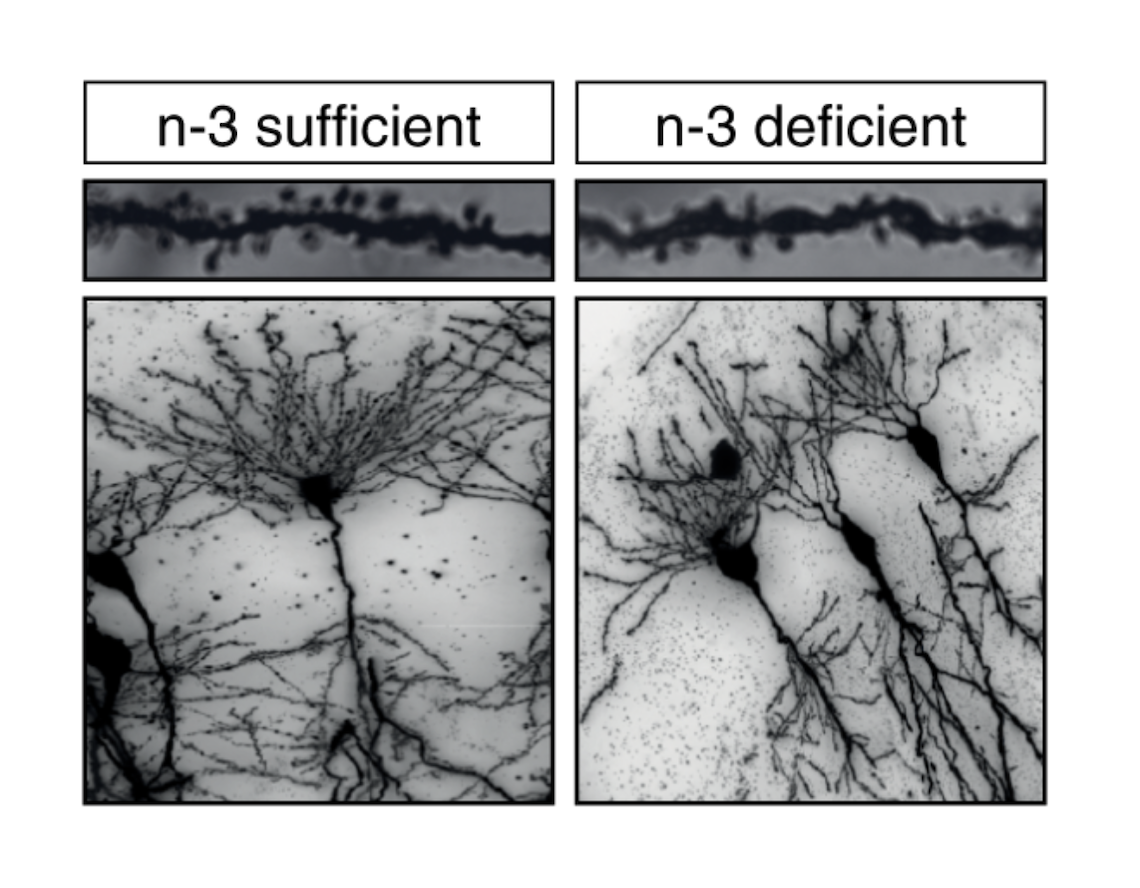Mobile Menu
- Education
- Research
-
Students
- High School Outreach
- Undergraduate & Beyond: Community of Support
- Current Students
- Faculty & Staff
- Alumni
- News & Events
- Giving
- About

Jim Oldfield

An international research team that includes scientists from the University of Toronto has found a cellular mechanism in mice that could explain why low intake of Omega 3 fats by mothers is linked to cognitive problems in their offspring — an association that growing evidence shows is also a risk for women and children.
The researchers found that a low Omega 3 status in mice pups led to malfunction in microglial cells, a type of immune cell that normally ‘prunes’ unnecessary synapses, or connections between neurons. The cells became overactive and pruned synapses they would normally leave alone, altering the formation of neural networks.
“We’ve known that Omega 3 fats are important for normal brain development, especially docosahexaenoic acid or DHA, but we haven’t known exactly why,” said Richard Bazinet, a co-author on the paper and professor of nutritional sciences at U of T. “Here we show that low DHA leads to excessive synaptic pruning by microglial cells especially in the hippocampus, which in turn leads to detrimental cognitive performance.”
The journal Nature Communications published the results today.
 The research was led by Professors Sophie Layé and Agnès Nadjar at INRAE Nouvelle-Aquitaine Research Centre and the University of Bordeaux, in collaboration with Food4BrainHealth, an international network that includes researchers from the University of Laval, Harvard University and other institutions.
The research was led by Professors Sophie Layé and Agnès Nadjar at INRAE Nouvelle-Aquitaine Research Centre and the University of Bordeaux, in collaboration with Food4BrainHealth, an international network that includes researchers from the University of Laval, Harvard University and other institutions.
Layé is cross-appointed to nutritional sciences at U of T as an adjunct professor, and she and her colleagues worked with Bazinet and his former doctoral student Kathryn Hopperton for over four years on the research. Hopperton is now a research fellow in the lab of Deborah O’Connor, professor and chair of nutritional sciences, who works with Bazinet in the Joannah & Brian Lawson Centre for Child Nutrition.
Bazinet said the international group will do further work to better understand connections between Omega 3s and human brain development, but that the results underscore the value for women and nursing mothers of monitoring their dietary intake of Omega fats, especially if they are at risk of being low in Omega 3s.
Omega 3s are found in fish and seafood, and some vegetable oils such as flax, soy and canola. Western diets tend to be low in Omega 3s and high in Omega 6s, which can be present in high amounts in factory-farmed meats, nuts and seeds, and oils such as sunflower and safflower.
 Studies have shown links between an Omega 3 and Omega 6 imbalance and neurological conditions in adults including dementia and schizophrenia. Growing evidence suggests Omegas play a critical role in brain development in early life as well, with potential effects on learning, memory and language development and in conditions such as autism.
Studies have shown links between an Omega 3 and Omega 6 imbalance and neurological conditions in adults including dementia and schizophrenia. Growing evidence suggests Omegas play a critical role in brain development in early life as well, with potential effects on learning, memory and language development and in conditions such as autism.
Bazinet said another finding of interest in the study was that DHA appears to regulate microglial cells by balancing the activity of Omega 6 fatty acids in the brain, further suggesting that the impact of Omegas may depend on their ratio to one another in the brain and in food.
Bazinet said his lab will continue to explore this finding, as they continue to develop and refine more effective ways to measure fatty acids and the bioactive molecules to which they give rise.


